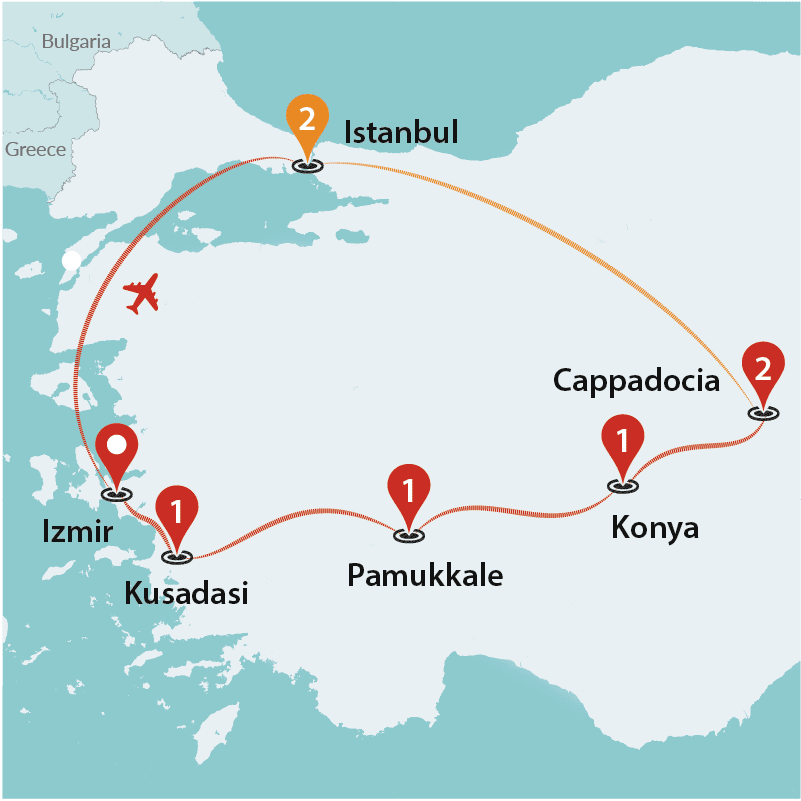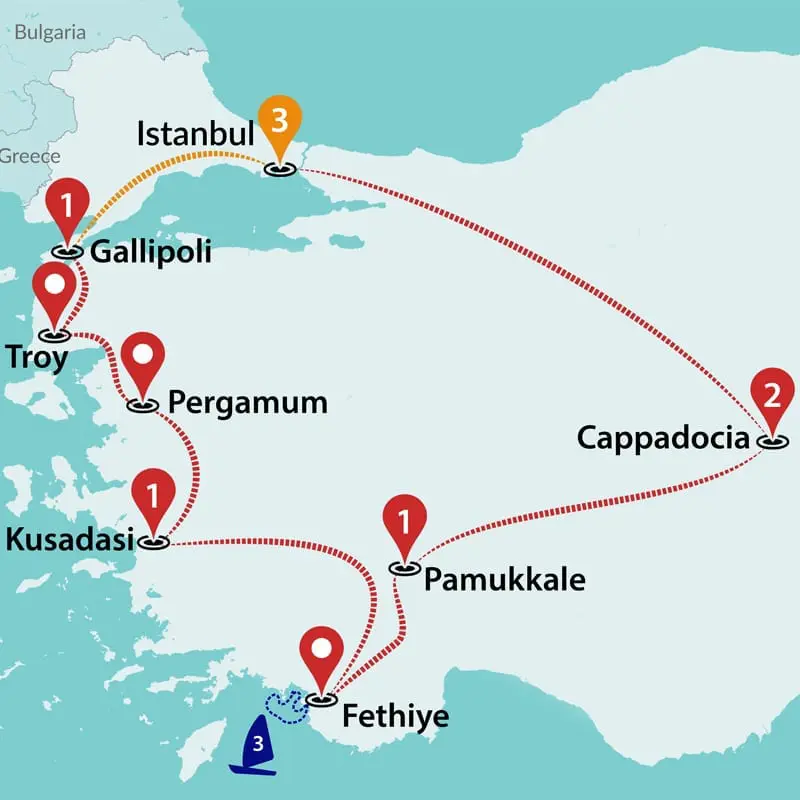Best Time To Visit Turkey
The best time to visit Turkey depends on which regions you are planning to include in your trip. There are 7 regions in Turkey, each hosting countless historical and natural sites to add to your itinerary. Spring and fall seasons are usually the ideal time for Turkey tours. From early April to late May, temperatures are moderate, and the blooming nature has a lot to offer.
Similarly, September and October are perfect times for sightseeing, since the warmness of summer lingers on and popular spots are less crowded. Summer is perfect for trips to Turkey as well, especially for visiting the Mediterranean and Aegean coast highlights such as Kusadasi and Fethiye.
In winter, the weather cools down, giving way to rain and snowfall across the country. It is a great season to enjoy the historic sites on the Aegean coast, and Cappadocia offers the best views for a photographic experience.
Why You Should Visit Turkey: Turkey is a breathtakingly diverse country that offers visitors a unique blend of culture, history, natural beauty, and modernity. From the bustling streets of Istanbul to the ancient ruins of Ephesus, Turkey is a traveler’s paradise. The country is also renowned for its cuisine, which includes delicious kebabs, mezze, and Turkish delight. Visitors can soak up the Mediterranean sun on the beaches of Antalya or explore the rugged terrain of Cappadocia. Whether you’re a history buff, nature lover, or foodie, Turkey has something for everyone.
Things to Consider: It’s important to research the visa requirements and obtain the necessary documentation before arrival. It’s also advisable to learn a few basic phrases in Turkish to help with communication. Turkey has a diverse climate, so packing for the season and region you plan to visit is crucial. Travelers should also be aware of cultural norms, such as dress codes when visiting mosques and temples. Finally, it’s important to take precautions for personal safety and avoid isolated areas at night. By being prepared and informed, visitors can fully enjoy the beauty and culture that Turkey has to offer.
Monthly Travel Guide For Turkey
Travelling in Turkey between January and March
January and February are the coldest months in Turkey, and the warmth of spring does not show itself till late March. The interior regions are covered in snow most of the winter. It is the least busy time in the country, so visiting the cities such as Istanbul is excellent for a quiet trip. Packing up for the cold and the rain is highly recommended.
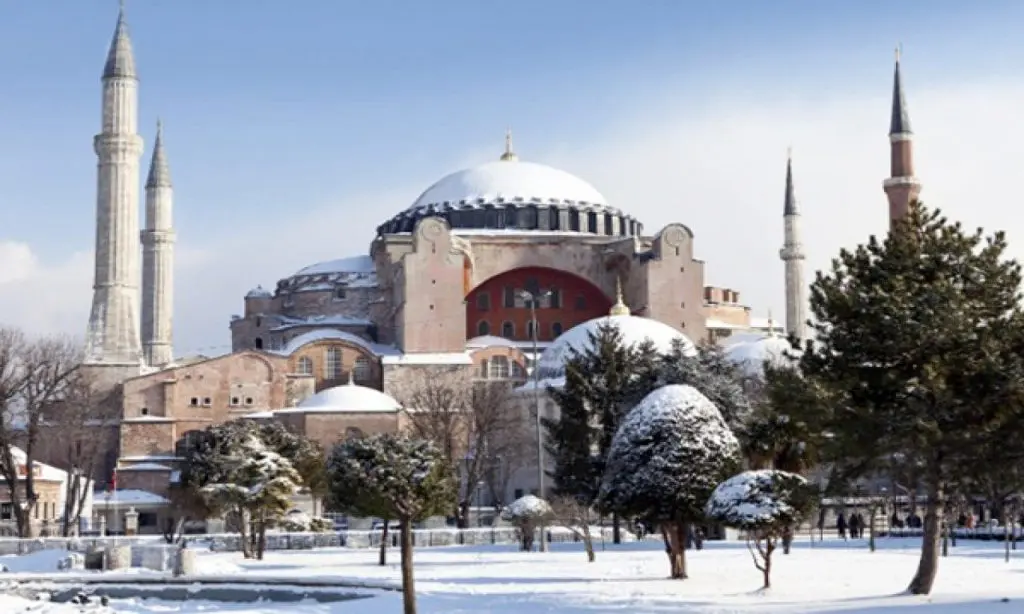
Travelling in Turkey in April and May
Occasional rains occur in the spring season in Turkey, but the weather is pleasantly warm, and nature is blooming. Temperatures vary around 60°F. April and May is the best time to visit Turkey, especially for exploring the ancient cities and landmarks scattered across the country.
Cappadocia offers the best views at sunset. Also, Istanbul hosts many cultural events during these months. You might want to wait for summer to plan a trip to the southern coast.

Travelling in Turkey between June and August
Summer is the peak season in Turkey, especially for visiting the Mediterranean Coast. The weather is hot and dry in the south, making it a perfect time for soaking up in the sun and cruising in the sea. Sea temperatures are also warmer compared to the spring season.
In Istanbul and the inner regions, daytime temperatures may reach 80°F. The landmarks on the Mediterranean and Aegean coasts are busy, but Cappadocia has fewer crowds.

Travelling in Turkey in September and October
The weather does not cool down until mid-September, making it a great time to enjoy the beaches on the Mediterranean and avoid the crowds of the summer season. Similar to the spring months, September and October offer pleasant times for visiting landmarks across the country.
The weather is warm in Cappadocia and Istanbul, and many cultural events take place in these regions. But packing for the seasonal rains is recommended. Autumn is the best time to visit Turkey before the winter colds come.

Travelling in Turkey in November and December
Temperatures drop across the country in November and December, the average temperature being around 50°F. Rainfall is seen in coastal regions and Istanbul, as snow is dominant in the inner regions such as Cappadocia.
If you don’t mind the cold, the snow-covered landscapes offer a remarkable photographic experience. It is also the least busy time in Turkey, which makes visiting the historic sites of Istanbul comfortable and pleasant.

Turkey Climate & Weather Guide
| Destination | Jan | Feb | Mar | Apr | May | Jun | Jul | Aug | Sep | Oct | Nov | Dec | |
|---|---|---|---|---|---|---|---|---|---|---|---|---|---|
| Istanbul | 🔆 | 7°C | 8°C | 10°C | 15°C | 20°C | 25°C | 28°C | 28°C | 24°C | 19°C | 13°C | 10°C |
| 🌧️ | 110 mm | 75 mm | 72 mm | 50 mm | 35 mm | 29 mm | 25 mm | 35 mm | 43 mm | 86 mm | 97 mm | 126 mm | |
| ❄️ | 24 mm | 15 mm | 3 mm | – | – | – | – | – | – | – | – | 7 mm | |
| Cappadocia | 🔆 | 3°C | 5°C | 9°C | 15°C | 19°C | 23°C | 27°C | 27°C | 23°C | 17°C | 11°C | 5°C |
| 🌧️ | 45 mm | 39 mm | 46 mm | 53 mm | 58 mm | 33 mm | 11 mm | 6 mm | 12 mm | 66 mm | 35 mm | 51 mm | |
| ❄️ | 30 mm | 21 mm | 10 mm | – | – | – | – | – | – | – | 2 mm | 12 mm | |
| Kusadasi | 🔆 | 8°C | 14°C | 16°C | 19°C | 24°C | 28°C | 30°C | 30°C | 27°C | 23°C | 18°C | 15°C |
| 🌧️ | 160 mm | 111 mm | 88 mm | 48 mm | 21 mm | 10 mm | 2 mm | 6 mm | 22 mm | 66 mm | 92 mm | 147 mm | |
| ❄️ | – | – | – | – | – | – | – | – | – | – | – | – | |
| Pamukkale | 🔆 | 10°C | 11°C | 15°C | 20°C | 25°C | 30°C | 33°C | 33°C | 29°C | 22°C | 17°C | 11°C |
| 🌧️ | 92 mm | 78 mm | 63 mm | 50 mm | 38 mm | 21 mm | 16 mm | 10 mm | 16 mm | 66 mm | 54 mm | 97 mm | |
| ❄️ | 22 mm | 14 mm | – | – | – | – | – | – | – | – | – | 5 mm | |
| Fethiye | 🔆 | 15°C | 16°C | 18°C | 22°C | 26°C | 30°C | 35°C | 35°C | 31°C | 26°C | 21°C | 17°C |
| 🌧️ | 87 mm | 142 mm | 87 mm | 44 mm | 27 mm | 11 mm | 7 mm | 5 mm | 19 mm | 66 mm | 113 mm | 197 mm | |
| ❄️ | – | – | – | – | – | – | – | – | – | – | – | – | |
| Gallipoli | 🔆 | 8°C | 9°C | 11°C | 16°C | 21°C | 26°C | 29°C | 29°C | 25°C | 20°C | 14°C | 11°C |
| 🌧️ | 112 mm | 77 mm | 74 mm | 52 mm | 37 mm | 31 mm | 27 mm | 37 mm | 44 mm | 88 mm | 99 mm | 128 mm | |
| ❄️ | 22 mm | 12 mm | 1 mm | – | – | – | – | – | – | – | – | 4 mm |
When to visit Turkey
Visit the Mediterranean in June-August
Summer is the best time to tour the Mediterranean Coast and enjoy the nightlife in the coastal cities of Turkey. Although the temperatures are high, it is the ideal time for chilling on the sun-soaked beaches and cruising on the turquoise sea. For a complete Mediterranean experience, you can check out our Sail Turkey tour, offering stops at some of the most pristine bays and coves in Turkey’s gorgeous coastline.
Visiting historical sites such as Ephesus might be relatively difficult because of the heat and long lines. It might be the best time to visit Turkey to see the ancient cities on the Aegean and Mediterranean coasts and get a taste of the unique history.
Tips for sailing in the Mediterranean Coast in the summer :
– Stay Hydrated: It’s essential to stay hydrated while sailing in the summer, as the heat and sun can be intense.
– The summer sun can be harsh, so it’s important to protect your skin and eyes from the sun’s harmful rays.
– Swimming in the crystal-clear waters of the Mediterranean can be a highlight of your sailing trip, but it’s essential to swim safely.
– The Mediterranean Coast of Turkey is known for its delicious cuisine, so be sure to try local specialties and fresh seafood.
Visit Istanbul in Spring-Fall
Spring and fall months are ideal for visiting Istanbul, the cultural capital of Turkey. Numerous music, art, and cultural festivals take place in April. Warm weather with occasional rains makes visiting the historic sites comfortable, such as Hagia Sophia and Topkapi Palace. It is also the best time for a Bosphorus cruise and shopping in Istanbul. The Grand Bazaar, the Spice Bazaar, and many open-air markets are perfect for shopping for traditional goods.
Late spring and early fall are the best times for Turkey tours. The moderate temperature makes it easy for sightseeing in places such as Gallipoli, Troy, and the Pamukkale travertines. Our Essential Turkey tour is perfect for exploring these destinations.
Tips for visiting Istanbul in the spring and fall:
– Visit the Grand Bazaar: Visiting in the spring and fall can offer a more relaxed shopping experience in the Grand Bazaar with fewer crowds.
– While the spring and fall can be less busy than the summer months, it’s still important to plan ahead.
-The mild weather in the spring and fall is perfect for exploring Istanbul’s outdoor attractions, such as the city’s many parks, gardens
Visit Cappadocia in Spring-Fall
April, May, and September are the best times to visit Cappadocia, the land of beautiful horses and spectacular sunsets. Located at the heart of Anatolia, Cappadocia has mild daytime temperatures and breezy nights during these months. Walking tours among the fairy chimneys and hot air balloon rides are enjoyable, and the International Wine Festival takes place in October.
Tips for visiting Cappadocia in the spring and fall:
– Cappadocia can be chilly in the mornings and evenings in the spring and fall, so be sure to bring a jacket or sweater.
-The temperatures are more moderate than in the summer, and the foliage can be quite beautiful.
-While the spring and fall are less crowded than the summer months, it’s still important to plan ahead, especially for popular activities like hot air balloon rides.
-The spring and fall are great times to try local dishes like pottery kebab, manti, and testi kebab.
Trips to Turkey in Winter
Temperatures are low in most of the country in winter, with rain and snowfall lasting from December to early March. During these months, the snow-covered lands in Cappadocia offer eye-catching views. Sightseeing in Istanbul and other regions is very comfortable if you don’t mind the weather. Winter is the best time to visit Turkey to enjoy the historical sites without the crowds.
Tips for visiting Turkey in the winter:
– Winter temperatures in Turkey can be quite chilly, especially in the evenings. Be sure to bring warm clothing, including a heavy coat, gloves, and a hat.
-While Turkey’s coastal areas can be less enjoyable in the winter, its cities are still vibrant and bustling.
–Turkish cuisine has many hearty winter dishes, such as soups, stews, and roasted meats. Be sure to try these dishes while you’re in Turkey to warm yourself up.
-Turkey is home to several natural hot springs, which can be especially enjoyable in the winter.
Turkey FAQ
What’s the cheapest time to go to Turkey?
Generally, the low season for tourism in Turkey is between November and March, which is the winter season when the weather is cooler and wetter. During this time, you are more likely to find cheaper flights and accommodation, and there will be fewer crowds at the popular tourist spots.
It’s important to note that some destinations in Turkey, such as Istanbul and Cappadocia, are popular year-round, so prices may not drop significantly even in the low season.
What is the hottest month in Turkey?
The hottest months in coastal regions are July and August, with average temperatures ranging from 28°C to 33°C (82°F to 91°F).
In the central and eastern regions, July and August are also the warmest months, with average temperatures ranging from 25°C to 30°C (77°F to 86°F).
What is the best month for sailing in Turkey?
The best months for sailing in Turkey are generally from May to October, with the peak season being between June and September.
During these months, the weather is warm and dry, with plenty of sunshine and ideal sailing conditions. The sea temperatures are also warm, ranging from 22°C to 27°C, making it comfortable for swimming and snorkeling.
When is the best time to visit Turkey to beat the crowds?
The best time to visit Turkey to beat the crowds is during the low season, which is typically from November to March, excluding major holidays such as New Year’s Eve and the Turkish national holidays.
During this time, tourist attractions are less crowded and prices for accommodations, tours, and flights are lower. However, it’s important to keep in mind that some tourist destinations, particularly Istanbul and Cappadocia, are popular year-round and may still be crowded during the low season.
When is the best time to visit Turkey to experience local culture?
To experience local culture in Turkey, the best time to visit is during the traditional Turkish festivals and celebrations. It’s best to visit during the last week of Ramadan, which is called Şeker Bayramı, when families and friends gather to celebrate the end of the fast and exchange sweets and gifts. Ramadan is between March 23 and April 21 in 2023.
It’s also worth visiting Turkey during the shoulder seasons (April-May and September-October) when the weather is mild and there are fewer crowds. During this time, you can explore local markets, sample regional cuisine, and experience everyday life in Turkey.
How many days do you need to visit Turkey?
To experience the main highlights of Istanbul, such as the Hagia Sophia, Blue Mosque, and Grand Bazaar, 3-4 days would be sufficient. For those interested in exploring the natural beauty of Cappadocia, 2-3 days would allow time to see the fairy chimneys, take a hot air balloon ride, and visit the underground cities. To fully explore Turkey’s coastline and experience its stunning beaches, a week or more would be necessary. Ultimately, the ideal length of a trip to Turkey will depend on your personal interests and priorities, but a minimum of 7-10 days would allow for a good introduction to the country.
What is the coldest month in Turkey?
Generally, the coldest month in Turkey is January, with average temperatures ranging from 0-10 degrees Celsius in most regions. However, the mountainous regions in the east and northeast can experience much colder temperatures and heavy snowfall during the winter months, making them popular for winter sports.
What are the best cities to visit in Turkey?
Turkey has a rich history and culture, and is home to many fascinating cities with unique attractions. Istanbul is perhaps the most famous, with its stunning architecture, rich history, and vibrant street life. Other top cities to visit in Turkey include Antalya, known for its stunning beaches and ancient ruins, Cappadocia, famous for its unique rock formations and hot air balloon rides, Bodrum, with its lively nightlife and yacht-filled marina, and Izmir, a bustling city with a rich cultural heritage and delicious cuisine
Is it safe to travel to Turkey?
Turkey is generally a safe country for travellers, with low crime rates and a welcoming local population. However, visitors should exercise caution in crowded tourist areas, especially in Istanbul, and avoid any political protests or demonstrations. It’s also recommended to be aware of your surroundings and belongings when in public places.
What are the most beautiful places in Turkey?
Turkey is a stunningly beautiful country with a diverse landscape that includes beaches, mountains, valleys, and unique rock formations. Some of the most beautiful places to visit in Turkey include the Cappadocia region, known for its fairy chimneys and underground cities, Pamukkale’s white terraces and thermal pools, the Turquoise Coast with its crystal-clear waters and hidden coves, Mount Nemrut, an ancient site with impressive stone statues and breathtaking views, and Lake Van, the largest lake in Turkey with stunning scenery and cultural attractions.
Does Turkey have nightlife?
Turkey has a vibrant nightlife scene, particularly in Istanbul, Bodrum, Antalya, and Izmir. In Istanbul, visitors can enjoy a wide range of nightlife options, from rooftop bars and nightclubs to traditional Turkish music and dance shows. Bodrum is famous for its lively nightlife, with many beach clubs and bars lining the shore, while Antalya offers a more relaxed nightlife scene with live music and cozy pubs. Izmir is also a popular destination for nightlife, with many bars and clubs in the city center and along the coast.
Which airlines fly directly into Turkey?
Turkey is well-connected by air, with many airlines offering direct flights from major cities around the world. Turkish Airlines is the national carrier and operates flights to Istanbul and other major cities in Turkey from most major cities. Other airlines that offer direct flights to Turkey include Pegasus Airlines, AtlasGlobal, British Airways, Air France, Lufthansa, and Emirates.
What to wear in Turkey?
Turkey is a predominantly Muslim country, and it’s advisable to dress modestly, especially when visiting religious sites. Women should cover their shoulders and avoid short skirts or shorts. Men should also dress modestly and avoid wearing shorts or sleeveless shirts in public places. In more conservative regions of the country, like rural areas, it’s recommended to cover your head with a scarf or hat. However, in major cities like Istanbul, Ankara, and Izmir, Western-style clothing is generally accepted. It’s also important to pack comfortable and sturdy shoes, as many of the historic sites and natural attractions in Turkey require walking or hiking.
What is Turkey famous for?
One of the most famous landmarks in Turkey is the Hagia Sophia, a beautiful and historic mosque in Istanbul that was once a church and a museum. Other famous historical sites include the ancient cities of Ephesus, Troy, and Hierapolis. Turkey is also known for its unique natural wonders, such as the fairy chimneys of Cappadocia, the thermal pools and white terraces of Pamukkale, and the stunning beaches and turquoise waters of the Aegean and Mediterranean coasts. Turkish cuisine is also renowned around the world for its rich flavors and unique dishes, such as kebabs, baklava, Turkish delight, and Turkish coffee.
What is the best time to eat delicious food in Turkey?
The summer months (June-August) are great for enjoying fresh seafood, grilled meats, and refreshing cold drinks like ayran or lemonade. The Aegean and Mediterranean coasts are particularly famous for their seafood dishes.
In the autumn months (September-November), you can enjoy seasonal dishes like roasted chestnuts, pumpkin soup, and stews made with root vegetables. This is also the time of year when Turkish tea and apple tea are enjoyed most.
In the winter months (December-February), hearty dishes like lamb stew, bean soup, and lentil soup are popular. The holiday season is also a time when many traditional sweets are enjoyed, like baklava, Turkish delight, and stuffed dried fruits.
Do you need a visa to visit Turkey?
Yes, most visitors need a visa to enter Turkey. However, the visa requirements vary depending on your nationality and the purpose of your visit. Visitors from many countries can obtain an e-Visa online before traveling to Turkey. The e-Visa is a simple and fast way to obtain a visa, and it’s valid for up to 90 days. Alternatively, you can also apply for a visa at a Turkish embassy or consulate in your home country.
There are also some countries whose citizens are exempt from a visa for a certain period. For example, citizens of some European Union countries, as well as the United States and Canada, can enter Turkey without a visa for up to 90 days within a 180-day period.
Turkey by Season

Winter
The unique landscape of Cappadocia is stunning year-round, but it can be especially beautiful in winter when the fairy chimneys are covered in snow.
Winter is the best time to take advantage of the historic landmarks of Turkey which offer a thrilling indoor experience. Visit Hagia Sophia, Topkapi Palace, and the Grand Bazaar from December to February.
Best Things to do in Turkey in winter:
Spend an afternoon in the thermal baths and spas of Turkey, called hamam, and the hot springs at Pamukkale. Try traditional dishes such as Mantı, a type of Turkish dumplings, and Iskender kebab.

Spring
The best time to enjoy the magical landscape of Cappadocia with a hot air balloon ride, as the skies are clear. Turkey has a long coastline with many beautiful beaches, and in the spring, the weather is warm enough to enjoy them without the crowds of the high season.
In the spring, the weather is mild and the crowds are smaller in Ephesus ancient city, making it a great time to explore the site and learn about its fascinating history.
Best Things to do in Turkey in spring:
Visit Gallipoli in April for Anzac Day and pay tribute to the fallen soldiers of WWI. Pay a visit to Istanbul Tulip Festival and take in the bewitching smell of the gardens.
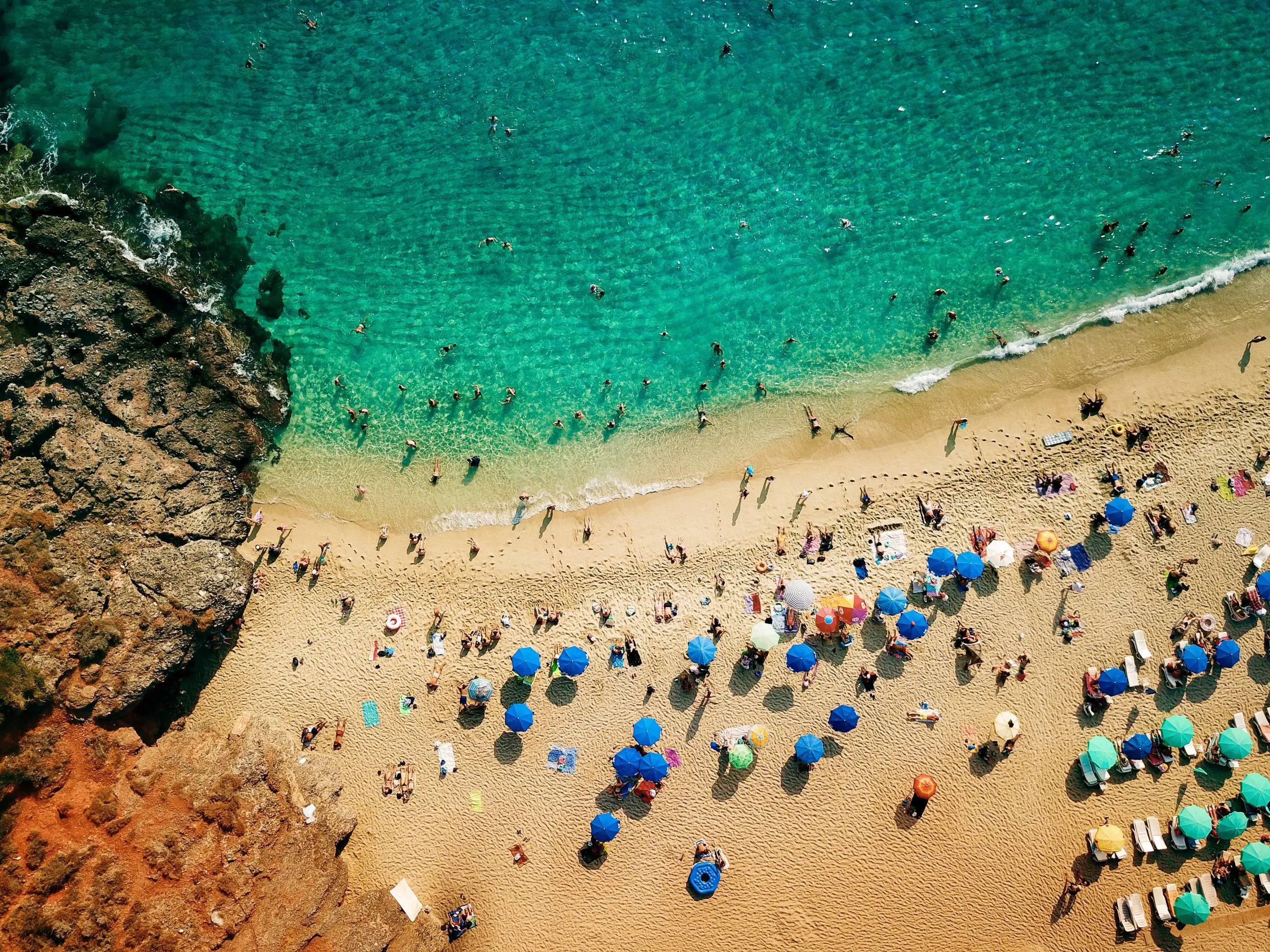
Summer
The Turkish Riviera, also known as the Turquoise Coast, is a scenic stretch of coastline with dramatic cliffs, turquoise waters, and picturesque villages. Summer is the best time to take a boat tour to explore hidden coves and swim in the secluded bays of Turkey.
Best Things to do in Turkey in summer:
Attend Istanbul Jazz Festival and smaller festivals offering live music, dancing, and cultural experiences. Catch a breeze on a ferry ride or Bosphorus tour. Relish the fresh seafood of the Mediterranean.
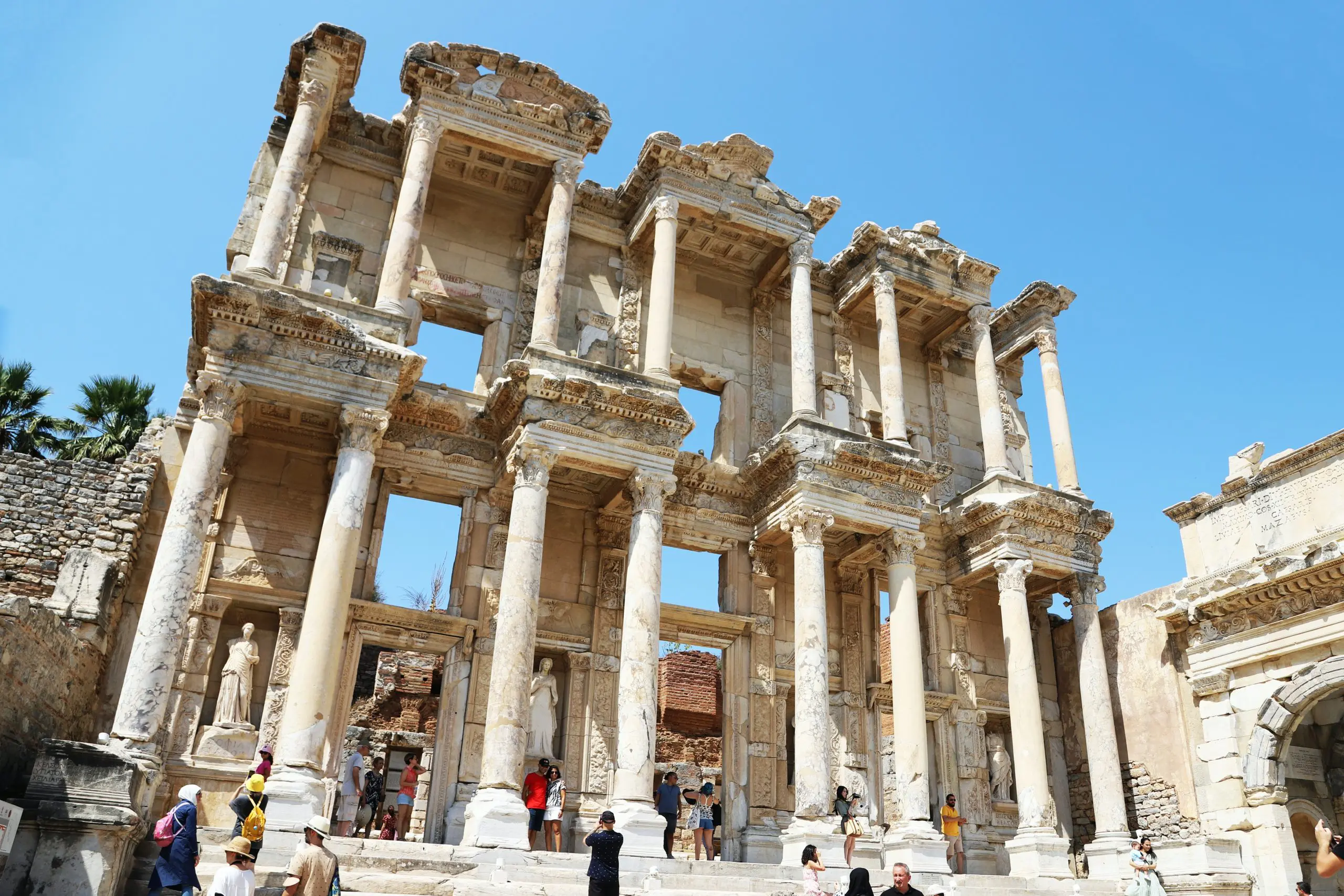
Autumn
Turkey’s countryside is filled with beautiful colors and landscapes in the autumn. It is the best time to enjoy cultural excursions in famous ancient cities like Troy and Ephesus surrounded by magical backdrops.
The beaches of the Aegean and the Mediterranean offer serene getaways in the shoulder season.
Best Things to do in Turkey in autumn:
Take advantage of the rainy weather to use your museum pass to the fullest. Revel in the trendy contemporary art scene of Istanbul.
 September Sale: 50% Off
September Sale: 50% Off Croatia Sailing 2025: 50% Off
Croatia Sailing 2025: 50% Off ANZAC Day Trips : Save 40%
ANZAC Day Trips : Save 40%  Central & Eastern Europe Tours: 50% Off
Central & Eastern Europe Tours: 50% Off  Why Travel Talk
Why Travel Talk Travel Talk Blog
Travel Talk Blog Responsible Travel
Responsible Travel Fair Travels with Travel Talk
Fair Travels with Travel Talk
